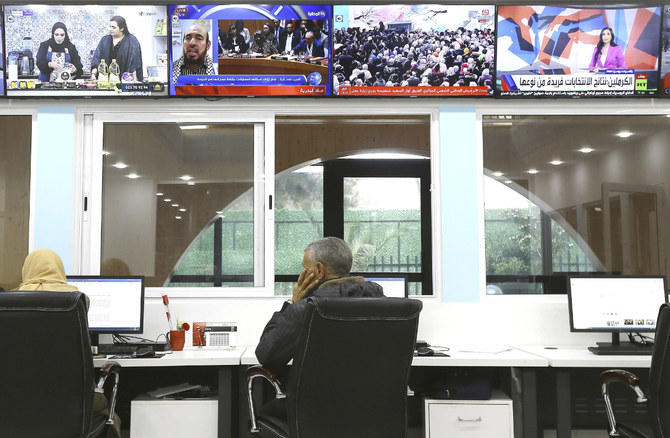ALGIERS, Algeria: Officials in Algeria are chiding television stations over the content choices they’ve made since the start of Ramadan last week, injecting religion into broader discussions about how the country regulates content and advertising in media.
Their criticisms come amid broader struggles facing journalists and broadcasters, where television stations and newspapers have historically relied heavily on advertising from the government and large state-aligned enterprises in the oil-rich nation.
After meeting with station directors on Sunday, Algerian Communications Minister Mohamed Lagab accused networks of not respecting ethical and professional lines, calling their programmatic choices “out of keeping with the social traditions of our society and especially the sacredness of the month of Ramadan.”
Lagab, a former journalism school professor, preemptively rebuffed accusations of censorship, arguing that his ministry’s push didn’t run counter to Algeria’s constitutional press freedom guarantees.
“Television stations have the right to criticize, but not by attacking our society’s moral values,” he said.
Though he did not explicitly name any specific stations or programs, Lagab cited soap operas as a particular concern. His ministry last week summoned a director for the country’s largest private station, Echourouk, over a soap opera called “El Barani” that showed characters consuming alcohol and snorting cocaine — depictions that sparked rebuke from viewers concerned they were incompatible with Ramadan.
Lagab also criticized stations for dedicating excessive airtime to advertising, so much so that it rivaled the run time of certain shows. “If we put advertising (and programs) side by side, we would conclude they last longer than the soap operas broadcast,” Lagab said.
His remarks followed statements from Algeria’s Authority of Audiovisual Regulations, which polices television and radio stations. Throughout March, it has called on national television stations to rein in advertising and respect families and viewers during Ramadan, a holy month observed throughout the Muslim-majority country and broader region.
Lagab’s two-pronged attack — against stations’ content and advertising — is the latest challenge facing Algerian television stations, which are preparing for deepened financial strain as the government prepares new regulations on advertising in media. In anticipation of a new law, stations, especially private ones, have ramped up advertising to an unprecedented extent, hoping to rake in profits before the government sets new limits.
The advertising blitz has been particularly pronounced since Ramadan began last week. As demand increases for food and other consumer products used throughout the holy month, stations have found no shortage of advertisers.
Even if stations don’t change course after meeting with Lagab, experts say the government’s criticisms are unlikely to escalate into punishments like sanctions or fines.
“Most of these channels are politically aligned with the government and zealously support it,” said Kamal Ibri, a journalist whose news website closed for lack of advertising revenue.
Algeria’s largest television stations are a mixture of publicly and privately owned. Networks including the private Echourouk, private El Bilad and the state-owned ENTV broadcast news and other programming, including soap operas. In prior years, viewers have grown accustomed to special Ramadan-specific programs during that period.
Though some private channels have begun platforming opposition parties recently, few broadcast pointed criticisms of the government. Those that do have in recent years been penalized.
Journalist Ihsane El Kadi ‘s media company, which oversaw web television and radio programming was shuttered and had its equipment confiscated. He was sentenced to prison for “threatening state security” in April 2023.
















